By Dale Minnich
Thirty leaders of Eglise des Freres Haitiens (the Church of the Brethren in Haiti) gathered with about 20 persons from the United States for the first Haiti Service Ministries Consultation on Nov. 19-23. The focus was learning about Brethren ministries underway in Haiti, and building bridges of partnership among the Haitian Brethren and American Brethren. It was sponsored by the Global Mission and Service of the Church of the Brethren and organized by Dale Minnich, a volunteer with the Haiti Medical Project, with help from many persons.

Participants at the Haiti consultation join hands. The consultation brought together some 30 Haitian church leaders and leaders in the Haiti Medical Project with about 20 American Brethren and leaders from the United States who are involved in the ministries in Haiti.
The consultation included broad involvement from Brethren groups that are related to the ministries in Haiti, and to the Haiti Medical Project, including Global Mission staff, a representative of the Mission and Ministry Board, the Annual Conference moderator, representatives from the Brethren Revival Fellowship and the Brethren Mission Fund, representatives of Brethren World Mission, leaders from the Plains districts, and leaders of the Haitian-American community in the Church of the Brethren. Also on the trip were members of the family related to the Royer Foundation, and participants from the University of Maryland.
The theme of Haitian pastor Romy Telfort’s opening worship, 1 Corinthians 12, focused on the unity in Christ of persons of different gifts and backgrounds. “One body, one spirit” emerged as a point of emphasis many times during the group’s four days together.
The group spent two mornings visiting rural communities, meeting local leaders, and experiencing the flavor of the development ministries of the church in Haiti. The group saw two recently completed water projects, visited with newly trained rural health workers, saw recently installed medical dispensaries, experienced the warm hospitality of congregations, and worshiped with Haitian Brethren congregations.
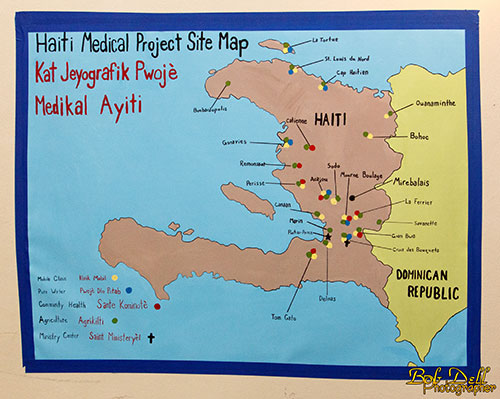
A map shows locations of project sites of the Haiti Medical Project
Visit to a mobile medical clinic
A highlight was experiencing a mobile clinic of the Haiti Medical Project in Acajou. Word had spread that there would be more doctors and nurses available than on most clinic days. As a result, more than 600 people filled the local school and church buildings and congregated under nearby shade trees, hoping to receive care. By the end of the day, 503 patients had been seen–by far a daily record for the program–still leaving 100 or so who could not be treated that day.
The mobile clinic team worked in hot and crowded conditions until late afternoon without a lunch break. The team was expanded with the addition of two of the consultation group members: physician David Fuchs and nurse Sandy Brubaker, both from eastern Pennsylvania. Sandy and her husband, Dr. Paul Brubaker, represented the Brethren World Mission.
Water projects
In addition to two “pure water” projects that were visited–a capped spring in Acajou and a system for harvesting and treating rain water in Morne Boulage–the group heard a presentation on the new cistern and water filtration system at New Covenant School in St. Louis du Nord. This project provides clean water for 350 school children and others in the community. Harris Trobman and Dr. Chris Ellis from the University of Maryland partnered with the Brethren to provide excellent technical assistance in planning and implementing the project, that also includes a rooftop garden, a small soccer yard, and other child-friendly features.
The community development team of the Haitian church also shared plans and emerging ideas for six additional communities where new water projects are under study. Helping communities find ways to have safe drinking water is an emerging priority for the Haiti Medical Project and represents one of the needs for additional funding from congregations and individuals.
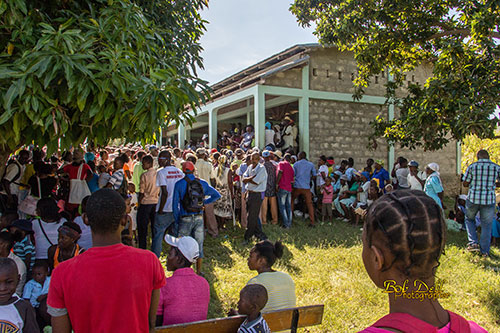
A large crowd of hundreds gathers at the mobile medical clinic held at Acajou
Health care in remote villages
In Morne Boulage, the group experienced the plight of remote communities in Haiti. Access to the mountain village by auto is very difficult. Two of the group’s mini-vans got stuck on muddy tracks. Everyday needs often require a two- or three-hour journey by foot to a more suitable road where villagers catch a ride into a town that has a market or needed supplies. Purchases of simple health remedies are not practical in many cases just because of the remote location.
However, through the Haiti Medical Project there is now a small dispensary with common medicines available at modest prices, right in the village. It is administered by one of several trained rural health volunteers and represents a gain for the community.
Another difficulty related to the remote location is the birthing process. Births in this mountain village are almost all in homes, few with any experienced or trained care. However, in recent months several of the local persons who attend births have been through a course in basic sanitation, have been provided with sanitary birthing kits, and have received other instruction. Additional “matrons” will be trained. Regular visits are being made by a teaching maternal care nurse. Perhaps, as a result, future maternal deaths may be prevented.
Church building
While not a feature of Haiti Medical Project, American Brethren also are helping local congregations in Haiti build suitable church buildings. The consultation group learned that a new church building in Raymonsaint is nearly completed. Another priority is a larger facility being built by the Croix des Bouquets congregation, not far from the Brethren Ministry Center. Consultation member Dale Wolgemuth of Manheim, Pa., represented the Brethren Mission Fund that is one of the supporters of this project, and made a point of visiting the construction site.
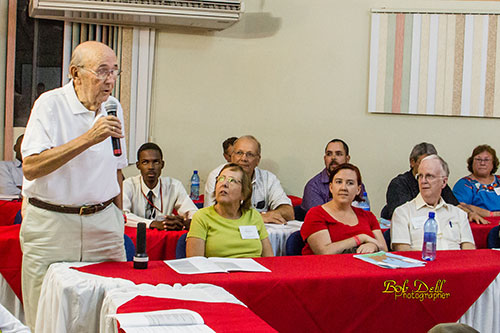
Ken Royer speaks at the Haiti consultation
On the final evening of the consultation the group celebrated two new grants to assist about 20 communities with agricultural production and addressing community health.
The Church of the Brethren’s Global Food Crisis Fund awarded $35,000 for a series of agriculture projects and to enable an expanded program of teaching improved practices.
Grants from the Royer Family Foundation provide 2016 support to the Haiti Medical Project for about half of the 48 mobile clinics held annually; support for the community development staff who work with community health and water projects; funding for specific aspects of these ministries; funding for staff training; and funding for an interpretive video to be produced for the 2016 Annual Conference. The Royer Family Foundation also is providing a grant for the Haiti Medical Project’s endowment fund. The new series of grants from the Royer Foundation total $124,205.
The consultation group enjoyed getting to know four members of the Royer family who participated in the trip, including founder Ken Royer. The family member were present to see the work in Haiti for the first time.
“Most of what we at the Foundation were hearing has been in writing or through some photographs. It was just a powerful experience to see those words come to life, to see a medical clinic, to meet the people doing the work,” commented Becky Fuchs, who is a member of the Royer family and a Church of the Brethren pastor.
Interviewed by phone after her return from the trip, Fuchs spoke about the value of seeing the work in Haiti first-hand. The people who have organized and are carrying out the Haiti Medical Project “had a spiritually motivated vision, and took the risk, and did the work to make that vision become part of our overall call to God’s shalom,” she said.
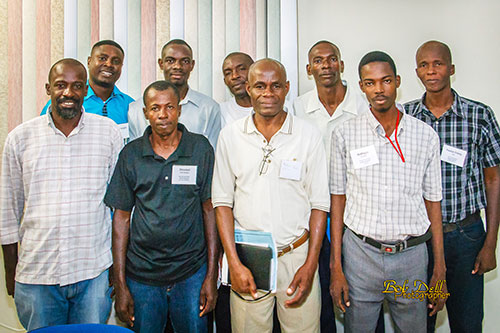
The Haiti National Committee represents the top leadership of l’Eglise des Freres Haitiens
“We come away deeply impressed with the caliber of the people doing the work in Haiti, their deep compassion for the people they are trying to help. I think all of us in our family feel a deeper partnership, we are more involved.
“Haiti is a beautiful country,” she added. “We lose sight of that because of the deep level of poverty.” However, she also pointed to the enthusiasm of the Haitian Brethren and their leaders. “There’s a lot of hope and there’s actual progress. The amount of progress in the last two years is phenomenal.”
The participants
Both the Haitian and American Brethren appreciated the strong, affirming role of Annual Conference moderator Andy Murray. He brought greetings in several settings, and served well as the “face” of the Church of the Brethren in the US.
Global Mission and Service staff and volunteers included onsite mission workers Ilexene and Michaela Alphonse, who coordinated the daily worship led by Haitian pastors and other leaders; Paul Ullom-Minnich, a physician from Kansas and volunteer convener of the Mobile Clinics Coordinating Committee; and Jeff Boshart, manager of the Global Food Crisis Fund.
Ludovic St. Fleur, a pastor from Miami, Fla., and an advisor to the National Committee of L’Eglise des Freres Haitiens, was among the Haitian pastors and spiritual leaders who shared moving personal stories of the amazing emergence of the Haitian church during a 12-year period that saw devastating disasters. St. Fleur was an illegal immigrant to the US, imprisoned for a while, who became the founder and pastor of Miami Haitian Church of the Brethren. More recently he has been a driving force in the movement to start churches in Haiti. Jean Bily Telfort was a children’s worker who became a pastor and led the development of the Croix des Bouquets church. Freny Elie was a school administrator who was challenged to begin a Bible study that grew into a large Brethren church in Cap Haitian. Romy Telfort was a taxi driver who drove St. Fleur to hold preaching meetings, and grew into the role of pastor of a large congregation in Gonaives. All told, the Haitian Brethren have begun 20 congregations since 2003, with active participants now totaling about 1,500 persons.
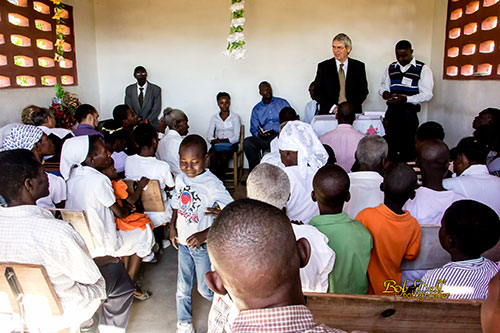
Annual Conference moderator Andy Murray preaches for a congregation in Haiti
The consultation also heard from Klebert Exceus and Ullom-Minnich about the way the Haiti Medical Project grew out of the large Brethren Disaster Ministries response that followed the 2010 earthquake. Exceus coordinated disaster response for several years, and Ullom-Minnich was one of the doctors for the first series of mobile health clinics held after the earthquake. These served as something of a prototype for a longer-range plan of mobile clinic care that he was instrumental in planning and inaugurating.
On Sunday of the consultation, members of the group joined in worship in one of three congregations accessible to Mirebalais. In each service the consultation provided a guest preacher: at La Ferriere, Murray preached; at Sodo, the preacher was Becky Fuchs, pastor of Mountville (Pa.) Church of the Brethren; and at Acajou, the preacher was Vildor Archange, coordinator of Community Health and Water Projects.
We enjoyed coming together to experience our unity with Haitian Brethren, to form new friendships, to learn first-hand about the ministries of the Haitian church, and to envision a future that includes a fruitful and growing Brethren presence in Haiti.
— Dale Minnich is retired from many years of service on the denominational staff of the Church of the Brethren, currently is a volunteer with the Haiti Medical Project. Cheryl Brumbaugh-Cayford also contributed to this report. Find out more about the church in Haiti at www.brethren.org/partners/haiti . Find out more about the Haiti Medical Project at www.brethren.org/haiti-medical-project .